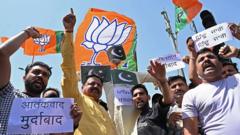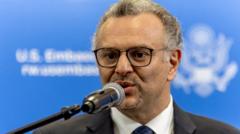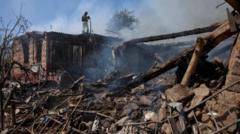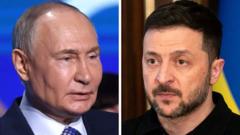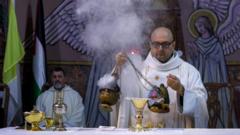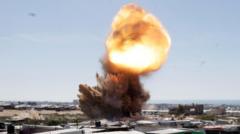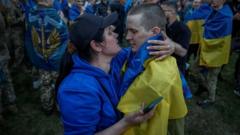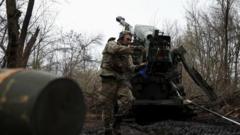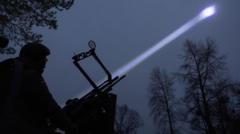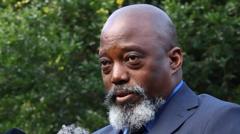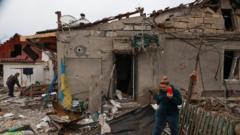The Democratic Republic of Congo and M23 rebel group have reached a ceasefire agreement during recent talks in Qatar, aimed at addressing the escalating conflict in the eastern region of the country.
DR Congo and M23 Rebels Announce Ceasefire Agreement in Peace Talks
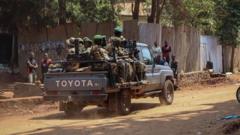
DR Congo and M23 Rebels Announce Ceasefire Agreement in Peace Talks
Both parties commit to halt violence until mediation concludes, in an effort to restore stability in Eastern DR Congo.
The Democratic Republic of Congo (DRC) has come to a significant ceasefire agreement with the Rwandan-backed M23 rebel group during talks mediated by Qatar. This truce is set to pause hostilities in eastern DRC until peace negotiations conclude. Authorities have reported that over 7,000 individuals have lost their lives since the beginning of the year due to the resurgence of violence.
During a week-long dialogue, both sides issued a joint statement describing their discussions as "frank and constructive." In a recent meeting in Doha, DRC President Félix Tshisekedi and Rwandan President Paul Kagame expressed mutual support for an "unconditional" ceasefire in a hopeful step towards reconciliation.
The conflict has further escalated since January when M23 launched a heightened offensive that resulted in the capture of Goma and Bukavu, two of the largest cities in eastern DRC. The Congolese government accuses Rwanda of providing military support to the rebel group, which both the UN and US have corroborated; however, Rwanda denies any such involvement.
Rwanda claims its actions are defensive, aimed at countering threats from Congolese forces and allied militias, some of which have connects to the Rwandan genocide of 1994. Additionally, DRC accuses Rwanda of illegally exploiting its mineral wealth but Rwanda refutes these claims.
In their most recent joint statement, both the M23 and DRC government pledged to support the peace talks and emphasized a commitment to cease hostilities, reject hate speech, and encourage local communities to do the same. The ceasefire will remain in place throughout the duration of the negotiations.
Despite some setbacks reported in the Qatar negotiations due to “technical” issues, the outcome represents a critical step towards ceasing violence, as highlighted by Belgium’s Foreign Affairs Minister Maxime Prevot. Qatar's mediation has become crucial since the M23 refused to participate in peace talks previously scheduled in Angola.
The DRC government has long categorized the M23 group as a "terrorist" organization and has refrained from engaging directly in dialogue until now. This move, however, reflects an urgent need to foster peace and stability in a region strained by ongoing conflict.
During a week-long dialogue, both sides issued a joint statement describing their discussions as "frank and constructive." In a recent meeting in Doha, DRC President Félix Tshisekedi and Rwandan President Paul Kagame expressed mutual support for an "unconditional" ceasefire in a hopeful step towards reconciliation.
The conflict has further escalated since January when M23 launched a heightened offensive that resulted in the capture of Goma and Bukavu, two of the largest cities in eastern DRC. The Congolese government accuses Rwanda of providing military support to the rebel group, which both the UN and US have corroborated; however, Rwanda denies any such involvement.
Rwanda claims its actions are defensive, aimed at countering threats from Congolese forces and allied militias, some of which have connects to the Rwandan genocide of 1994. Additionally, DRC accuses Rwanda of illegally exploiting its mineral wealth but Rwanda refutes these claims.
In their most recent joint statement, both the M23 and DRC government pledged to support the peace talks and emphasized a commitment to cease hostilities, reject hate speech, and encourage local communities to do the same. The ceasefire will remain in place throughout the duration of the negotiations.
Despite some setbacks reported in the Qatar negotiations due to “technical” issues, the outcome represents a critical step towards ceasing violence, as highlighted by Belgium’s Foreign Affairs Minister Maxime Prevot. Qatar's mediation has become crucial since the M23 refused to participate in peace talks previously scheduled in Angola.
The DRC government has long categorized the M23 group as a "terrorist" organization and has refrained from engaging directly in dialogue until now. This move, however, reflects an urgent need to foster peace and stability in a region strained by ongoing conflict.



